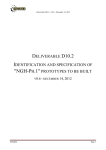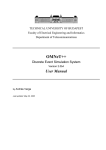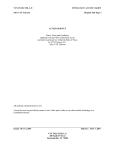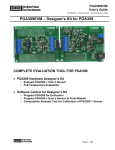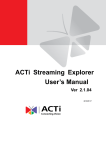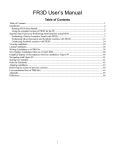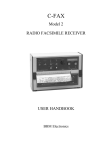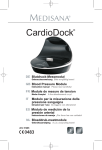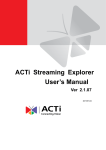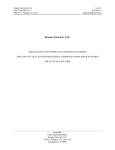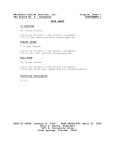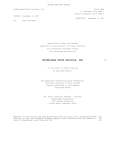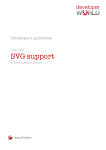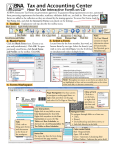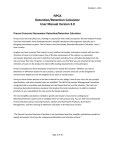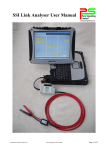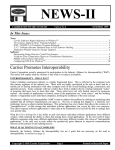Download GCI COMMUNICATION CORP. TARIFF F.C.C. NO. 3 By: Cynthia L
Transcript
GCI COMMUNICATION CORP. TARIFF F.C.C. NO. 3 1st Revised Page 187 Replaces Original Page 187 ACCESS SERVICE 13. Additional Engineering, Additional Labor and Miscellaneous Services In this section, normally scheduled working hours are an employee’s scheduled work period in any given calendar day (e.g., 8:00 am to 5:00 pm) for the application of rates based on working hours. A Miscellaneous Service Order charge as described in 5.4.2 preceding may be applicable to services ordered from this section. 13.1 Additional Engineering Additional Engineering, including engineering reviews as set forth in 5.4.3 preceding, will be undertaken only after the Company has notified the customer that additional engineering charges apply as set forth in the Rate Sections, beginning in Section 16, following, and the customer agrees to such charges. T Additional Engineering will be provided by the Company at the request of the customer only when: 13.1.1 A customer requests additional technical information after the Company has already provided the technical information normally included on Design Layout Report (DLR) as set forth in 6.1.5 and 7.1.6 preceding. 13.1.2 Additional engineering time is incurred by the Company to engineer a customer’s request for a customized service as set forth in 7.1.2 preceding. 13.1.3 A customer requested Design Change requires the expenditure of additional engineering time. Such additional engineering time is incurred by the Company for the engineering review as set forth in 5.4.3 preceding. The charge for additional engineering time relating to the engineering review, which is undertaken to determine if a Design Change is indeed required, will apply whether or not the customer authorizes the Company to proceed with the Design Change. In this case the Design Change charge, as set forth in the Rate Sections, beginning in Section 16, following, does not apply unless the customer authorizes the Company to proceed with the Design Change. 13.2 Additional Labor Additional Labor is that labor requested by the customer on a given service and agreed to by the Company as set forth in 13.2.1 through 13.2.5 following. The Company will notify the customer that additional labor charges as set forth in the Rate Sections, beginning in Section 16, following will apply before any additional labor is undertaken. When provisioning or restoring Telecommunications Service priority services, the Company will, when possible, notify the customer of the applicability of these Additional Labor charges. T T T 13.2.1 Overtime Installation Overtime installation is that Company installation effort outside of normally scheduled working hours. Issued: March 30, 2007 Effective: April 1, 2007 By: Cynthia L Lynch Tariffs and Licenses Manager GCI Communication Corp. 2550 Denali Street, Suite 1000 Anchorage, Alaska 99503 GCI COMMUNICATION CORP. TARIFF F.C.C. NO. 3 1st Revised Page 188 Replaces Original Page 188 ACCESS SERVICE 13. Additional Engineering, Additional Labor and Miscellaneous Services (Cont’d) 13.2 Additional Labor (Cont’d) 13.2.2 Overtime Repair Overtime repair is that Company effort performed outside of normally scheduled working hours. 13.2.3 Stand By Stand by includes all time in excess of one-half (1/2) hour during which Company personnel stand by to make installation acceptance tests or cooperative tests with a customer to verify facility repair on a given service. 13.2.4 Testing and Maintenance with Other Telephone Companies Additional testing, maintenance or repair of facilities which connect other telephone companies is that which is in addition to the normal effort required to test, maintain or repair facilities provided solely by the Company. 13.2.5 Other Labor Other labor is that additional labor not included in 13.2.1 through 13.2.4 preceding and labor incurred to accommodate a specific customer request that involves only labor which is not covered by any other section of this tariff. 13.3 Miscellaneous Services 13.3.1 Testing Services Testing Services offered under this section of the tariff are optional and subject to rates and charges as set forth in the Rate Sections, beginning in Section 16, following. Other testing services, as described in 6.2.4 and 7.1.7 preceding, are provided by the Company in association with Access Service and are furnished at no additional charge. Testing services are normally provided by Company personnel at Company locations. However, provisions are made in (B)(2) following for a customer to request Company personnel to perform testing services at the customer designated premises. T The offering of Testing Services under this of the tariff is made subject to the availability of the necessary qualified personnel and test equipment at the various test locations mentioned in (A) and (B) following. Issued: March 30, 2007 Effective: April 1, 2007 By: Cynthia L Lynch Tariffs and Licenses Manager GCI Communication Corp. 2550 Denali Street, Suite 1000 Anchorage, Alaska 99503 GCI COMMUNICATION CORP. TARIFF F.C.C. NO. 3 Original Page 189 ACCESS SERVICE 13. Additional Engineering, Additional Labor and Miscellaneous Services (Cont’d) 13.3 Miscellaneous Services (Cont’d) 13.3.1 Testing Services (Cont’d) (A) Switched Access Service Testing Services for Switched Access are comprised of (a) tests which are performed during the installation of a Switched Access Service, i.e., Acceptance Tests, (b) tests which are performed after customer acceptance of such Access Services and which are without charge, i.e., routine testing and (c) additional tests which are performed during or after customer acceptance of such access services and for which additional charges apply, i.e., Additional Cooperative Acceptance Tests and in-service tests. Routine tests are those tests performed by the Company on a regular basis, as set forth in 6.2.4 preceding which are required to maintain Switched Access Service. Additional inservice tests may be done on an automatic basis (no Company or customer technicians involved), on a manual basis (Company technician)s) involved at Company office(s) and Company or customer technician(s) involved at the customer designated premises). Testing services are offered to Dial Tone Office for FGA, to the access tandem or end office for FGB (wherever the FGB service is ordered) and to the end office for FGD. Testing Services for Directory Assistance Service not routed through an access tandem is ordered to a Directory Assistance Location for each NPA. (1) Additional Cooperative Acceptance Testing Additional Cooperative Acceptance Testing of Switched Access Service involves the Company provision of a technician at its office(s) and the customer provision of a technician at its premises, with suitable test equipment to perform the required tests. Additional Cooperative Acceptance Tests may, for example, consist of the following tests: - Impulse Noise Phase Jitter Signal to C-Notched Noise Ratio Intermodulation (Nonlinear) Distortion Frequency Shift (Offset) Envelope Delay Distortion Dial Pulse Percent Break Issued: October 20, 1997 Effective: October 21, 1997 By: Cynthia L Lynch Tariffs and Licenses Manager GCI Communication Corp. 2550 Denali Street, Suite 1000 Anchorage, Alaska 99503 GCI COMMUNICATION CORP. TARIFF F.C.C. NO. 3 1st Revised Page 190 Replaces Original Page 190 ACCESS SERVICE 13. Additional Engineering, Additional Labor and Miscellaneous Services (Cont’d) 13.3 Miscellaneous Services (Cont’d) 13.3.1 Testing Services (Cont’d) (A) Switched Access Service (Cont’d) (2) Additional Automatic Testing Additional Automatic Testing (AAT) of Switched Access Services (Feature Groups B and D) is a service where the customer provides remote office test lines and 105 test lines with associated responders or their functional equivalent. The customer may order, at additional charges, gainslope and C-notched noise testing and may order the routine tests (1004 Hz loss, C-Message Noise and Balance) on an as needed or more than routine schedule. The Company will provide an AAT report that lists the test results for each trunk tested. Trunk test failures requiring customer participation for trouble resolution will be provided to the customer on an as needed basis. The Additional Tests, (i.e., gain slope, C-notched noise, 1004 Hz loss, CMessage Noise and Balance) may be ordered by the customer at additional charges, 60 days prior to the start of the customer prescribed schedule. The rates for Additional Automatic Tests are as set forth in the Rate Sections, T beginning in Section 16, following. T (3) Additional Manual Testing Additional Manual Testing (AMT) of Switched Access Services (Feature Groups A, B and D and Directory Access Service not routed through an access tandem) is a service where the Company provides a technician at its office(s) and the Company or customer provides a technician at the customer designated premises with suitable test equipment to perform the required tests. Such additional tests will normally consist of gain-slope and C-notched noise testing. However, the Company will conduct any additional tests which the IC may request. M M M – Moved to Original Page 190.1. Issued: March 30, 2007 Effective: April 1, 2007 By: Cynthia L Lynch Tariffs and Licenses Manager GCI Communication Corp. 2550 Denali Street, Suite 1000 Anchorage, Alaska 99503 GCI COMMUNICATION CORP. TARIFF F.C.C. NO. 3 Original Page 190.1 ACCESS SERVICE 13. Additional Engineering, Additional Labor and Miscellaneous Services (Cont’d) 13.3 Miscellaneous Services (Cont’d) 13.3.1 Testing Services (Cont’d) (A) Switched Access Service (Cont’d) (3) Additional Manual Testing (Cont’d) The Company will provide an AMT report listing the test results for each trunk tested. Trunk test failures requiring customer participation for trouble resolution will be provided to the customer on a per occurrence basis. M The AMT may be ordered by the customer at additional charges, 60 days prior to the start of the testing schedule as mutually agreed to by the customer and the Company. The rates for AMT are as set forth in the Rate Sections, beginning in Section 16, following. M T/M T/M (4) M Obligation of the Customer The customer shall provide the Remote Office Test Line priming data to the Company, as appropriate, to support routine testing as set forth in 6.2.4(B) preceding or ATT as set forth in 13.3.1(A)(2) preceding. Issued: March 30, 2007 M Effective: April 1, 2007 By: Cynthia L Lynch Tariffs and Licenses Manager GCI Communication Corp. 2550 Denali Street, Suite 1000 Anchorage, Alaska 99503 GCI COMMUNICATION CORP. TARIFF F.C.C. NO. 3 Original Page 191 ACCESS SERVICE 13. Additional Engineering, Additional Labor and Miscellaneous Services (Cont’d) 13.3 Miscellaneous Services (Cont’d) 13.3.1 Testing Services (Cont’d) (A) Switched Access Service (Cont’d) (4) Obligation of the Customer (Cont’d) The customer shall make the facilities to be tested available to the Company at times mutually agreed upon. (B) Special Access Service The Company will provide assistance in performing specific tests requested by the customer. (1) Additional Cooperative Acceptance Testing When a customer provides a technician at its premises or at an end user’s premises, with suitable test equipment to perform the requested tests, the Company will provide a technician at is office for the purpose of conducting Additional Cooperative Acceptance Testing on Voice Grade Services. At the customer’s request, the Company will provide a technician at the customer’s premises or at the end user premises. These test may, for example, consist of the following: - Attenuation Distortion (i.e., frequency response) Intermodulation Distortion (i.e., harmonic distortion) Phase Jitter Impulse Noise Envelope Delay Distortion Echo Control Frequency Shift (2) Additional Manual Testing The Company will provide a technician at its premises, and the Company or customer will provide a technician at the customer’s designated premises with suitable test equipment to perform the requested tests. (3) Obligation of the Customer When the customer subscribes to Testing Service as set forth in this section, the customer shall make the facilities to be tested available to the Company at time mutually agreed upon. Issued: October 20, 1997 Effective: October 21, 1997 By: Cynthia L Lynch Tariffs and Licenses Manager GCI Communication Corp. 2550 Denali Street, Suite 1000 Anchorage, Alaska 99503 GCI COMMUNICATION CORP. TARIFF F.C.C. NO. 3 1st Revised Page 192 Replaces Original Page 192 ACCESS SERVICE 13. Additional Engineering, Additional Labor and Miscellaneous Services (Cont’d) 13.3 Miscellaneous Services (Cont’d) 13.3.2 Maintenance of Service (A) When a customer reports a trouble to the Company for clearance and no trouble is found in the Company’s facilities, the customer shall be responsible for payment of a Maintenance of Service charge as set forth in the Rate Sections, T beginning in Section 16, following for the period of time from when Company T personnel are dispatched, at the request of the customer, to the customer designated premises to when the work is completed. Failure of Company personnel to find trouble in Company facilities will result in no charge if the trouble is actually in those facilities, but not discovered at the time. (B) the customer shall be responsible for payment of a Maintenance of Service charge when the Company dispatches personnel to the customer designated premises, and the trouble is in equipment or communications systems provided by other than the Company or detariffed CPE provided by the Company. In either (A) or (B) preceding, no credit allowance will be applicable for the interruption involved if the Maintenance of Service Charge applies. 13.3.3 Telecommunications Service Priority - TSP Priority installation and/or restoration of National Security Emergency Preparedness (NSEP) telecommunications services shall be provided in accordance with part 64.401, Appendix A, of the Federal Communication Commission’s (FCC’s) Rules and Regulations. In addition, TSP System service shall be provided in accordance with the guidelines set forth in “Telecommunications Service Priority (TSP) System for National Security Emergency Preparedness (NSEP) Service Vendor Handbook” (NCSH 3/1/2) dated July 9, 1990, and “Telecommunications Service Priority System for National Security Emergency Preparedness Service User manual (NCSM 3-1-1). The TSP System is a service, developed to meet the requirements of the Federal Government, as specified in the Service Vendor’s Handbook and Service User’s Manual which provides the regulatory, administrative and operational framework for the priority installation and/or restoration of NSEP telecommunications services. These include both Switched and Special Access Services. The TSP System applies only to NSEP telecommunications services and requires and authorizes priority action by the Company providing such services. For Switched Access Service, the TSP System’s applicability is limited to those services which the Company can discreetly identify for priority provisioning and/or restoration. Issued: March 30, 2007 Effective: April 1, 2007 By: Cynthia L Lynch Tariffs and Licenses Manager GCI Communication Corp. 2550 Denali Street, Suite 1000 Anchorage, Alaska 99503 GCI COMMUNICATION CORP. TARIFF F.C.C. NO. 3 1st Revised Page 193 Replaces Original Page 193 ACCESS SERVICE 13. Additional Engineering, Additional Labor and Miscellaneous Services (Cont’d) 13.3 Miscellaneous Services (Cont’d) 13.3.3 Telecommunications Service Priority - TSP (Cont’d) A TSP charge applies as set forth in the Rate Sections, beginning in Section 16, when a request to provide or change a TSP is received subsequent to the issuance of an Access Order to install the service. T Additionally, a Miscellaneous Service Order Charge as set forth in the Rate Sections, beginning in Section 16, will apply to TSP requests that are ordered subsequent to the initial installation of the associated access service. T T A TSP charge does not apply when a TSP is discontinued or when ordered coincident with an Access Order to install or change service. In addition, Additional Labor rates as set forth in the Rate Sections, beginning in Section 16, may be applicable when provisioning or restoring Switched or Special Access Services with TSP. T When the customer requests an audit or a reconciliation of the Company’s TSP records, T a Miscellaneous Service Order Charge as set forth in the Rate Sections, beginning in T Section 16, and Additional Labor rates as set forth in the Rate Sections, beginning in T Section 16, are applicable. 13.3.4 Bill Name and Address Information The term “telecommunications service providers” as used in this provision includes interexchange carriers, operator service providers, enhanced service providers and other providers of interstate telecommunications services. Telecommunications service providers may request Billing Name and Address (BNA) information of the Company or the Company’s billing agent for a specifically stated Billed Telephone Number (BTN). M – Moved to Original Page 193.1. Issued: March 30, 2007 Effective: April 1, 2007 By: Cynthia L Lynch Tariffs and Licenses Manager GCI Communication Corp. 2550 Denali Street, Suite 1000 Anchorage, Alaska 99503 GCI COMMUNICATION CORP. TARIFF F.C.C. NO. 3 Original Page 193.1 ACCESS SERVICE 13. Additional Engineering, Additional Labor and Miscellaneous Services (Cont’d) 13.3 Miscellaneous Services (Cont’d) 13.3.4 Bill Name and Address Information (Cont’d) M BNA may be used only for billing purposes, order entry, customer service, fraud prevention and identification of customers who have moved from one location to another, per FCC Order 93-535, Docket 91-115. This information may not be used for marketing purposes and may not be disclosed to third parties other than governmental law enforcement agencies, per FCC Order 93-535, Docket 91-115. M The Company will provide BNA to telecommunications service providers on a perT request basis, using rates specified in the Rate Sections, beginning in Section 16. BNA M will be provided for all BTNs except where the subscriber’s number is un-published or un-listed and the subscriber has notified the Company that they do not want their BNA released for calling card calls and/or collect or third party calls. In addition, the Company shall have the right to audit the operations, procedures and systems of any telecommunications service provider that receives BNA, upon reasonable notice at reasonable times, to ensure that the telecommunications service provider is not using or disclosing BNA in violation of the terms of this tariff and applicable FCC M requirements. The Company will waive this audit right if the M – Moved from Original Page 193. Issued: March 30, 2007 Effective: April 1, 2007 By: Cynthia L Lynch Tariffs and Licenses Manager GCI Communication Corp. 2550 Denali Street, Suite 1000 Anchorage, Alaska 99503 GCI COMMUNICATION CORP. TARIFF F.C.C. NO. 3 1st Revised Page 194 Replaces Original Page 194 ACCESS SERVICE 13. Additional Engineering, Additional Labor and Miscellaneous Services (Cont’d) 13.3 Miscellaneous Services (Cont’d) 13.3.4 Bill Name and Address Information (Cont’d) telecommunications service provider provides a verified certificate that has posted a bond in the amount of $1,000,000 and in a form reasonably acceptable to the Company, against damages to the Company resulting from any use or disclosure by the telecommunications service provider of the BNA in violation of the terms of this tariff or applicable FCC requirements. The Company may terminate any waiver of this audit right, if such bond expires, by giving written notice to the telecommunications service provider. Requests for BNA must be submitted in writing. The request must be accompanied by : 1) Carrier Identification Code; 2) Specific BTNs for which BNA is requested; and 3) Contact name and number for verification. BNA will be provided in written form, on paper copy, or diskette, or on magnetic tape where available. 13.4 Presubscription Pursuant to the FCC’s Memorandum Opinion and Order, CC Docket No. 83-1145, Phase I, adopted May 31, 1985, and released June 12, 1985, the Allocation Plan, outlined in the Appendix B of this Order, is available for inspection in the Public Reference Room of the Tariff Division at the FCC’s Washington, D.C., location or may be obtained from the Commission’s commercial contractor. Presubscription is the process by which end user customers may select and designate to the Company an IC to access, without an access code, for intrastate or interstate calls. This IC is referred to as the end user’s predesignated IC. 13.4.1 New users who are served by end offices equipped with Feature Group D will be asked to presubscribe to an IC at the time they place an order with the Company for Telephone Exchange Service. They may select either of the following options. There will be no charge for this initial selection. - a primary interstate IC for all of its lines, - a primary intrastate IC for all of its lines, - a different interstate IC for each of its lines, - a different intrastate IC for each of its lines. Only one IC may be selected for each individual line or lines terminating in the same hunt group. Subsequent to the installation of Telephone Exchange Service and after the end user’s initial selection of a predesignated IC, for any change in selection, a nonrecurring charge as set forth in the Rate Sections, beginning in Section 16, following applies. Issued: March 30, 2007 T Effective: April 1, 2007 By: Cynthia L Lynch Tariffs and Licenses Manager GCI Communication Corp. 2550 Denali Street, Suite 1000 Anchorage, Alaska 99503 GCI COMMUNICATION CORP. 13. TARIFF F.C.C. NO. 3 1st Revised Page 195 Replaces Original Page 195 ACCESS SERVICE Additional Engineering, Additional Labor and Miscellaneous Services (Cont’d) 13.4 Presubscription (Cont’d) 13.4.2 If the new end user fails to designate an IC as his predesignated IC prior to the date of installation of Telephone Exchange Service, the Company will (1) allocate the end user to an IC based upon current IC presubscription ratios, (2) require the end user to dial an access code (10XXX) for all interstate calls, or (3) block the end user from interstate calling. The end user will be notified which option will be applied if they fail to presubscribe to an IC. An allocated or blocked end user may designate another IC or initial IC as its predesignated IC one time at no charge if it is requested within six months after the installation of Telephone Exchange Service. For any change in selection after six months from the installation of Telephone Exchange Service, a nonrecurring charge as set forth in the Rate Sections, beginning in Section 16, following applies. T T 13.4.3 If an IC elects to discontinue its Feature Group D Service offering prior to or within two years of the conversion, the IC will notify the Company of the cancellation. The IC will also notify all end users which selected them that they are canceling their service and that they should contact the Company to select a new primary IC. The IC will also inform the end user that it will pay the presubscription change charge. The canceling IC will then be billed by the Company the appropriate charge for each end user for a period of two years from the discontinuance of Feature Group D service. 13.4.4 If an IC elects to change a Carrier Identification Code (CIC) due to the surrendering of a CIC to the North American Numbering Plan Administration for reassignment, the presubscription change charge will be waived. The waiver is applied only when the IC surrenders the CIC on a nationwide basis. The waiver is effective until January 1, 1993. 13.4.5 If an IC elects to change or discontinue use of a CIC for any reasons other than those set forth in 13.4.4 above, the IC will identify to the Company any affected end users and advise the Company of the new CIC to be assigned to these end users. If the CIC change involves a change of carrier for any end users, the IC will notify the affected end users of the change. The Company will change the predesignated carrier code of each end user identified by the IC to the T new CIC and bill the IC the nonrecurring charge set forth in the Rate Sections, beginning in Section 16, following for each end user line or trunk that is changed. 13.5 Verification of Orders for Long Distance Telemarketing No IC shall submit to the Company a Primary Interexchange Carrier (PIC) change order generated by telemarketing unless and until the order has first been confirmed by accordance with one of the following procedures: Issued: March 30, 2007 Effective: April 1, 2007 By: Cynthia L Lynch Tariffs and Licenses Manager GCI Communication Corp. 2550 Denali Street, Suite 1000 Anchorage, Alaska 99503 GCI COMMUNICATION CORP. TARIFF F.C.C. NO. 3 Original Page 196 ACCESS SERVICE 13. Additional Engineering, Additional Labor and Miscellaneous Services (Cont’d) 13.5 Verification of Orders for Long Distance Telemarketing (Cont’d) 13.5.1 The IC obtains the billed party’s (e.g., an end user or the designator of the PIC for a pay telephone) written authorization to submit the PIC change order and confirms: - The billed party’s billing name and address and each telephone number to be covered by the PIC change order; - The billed party’s decision to change the PIC to the IC; and - The billed party’s understanding of the PIC change fee. 13.5.2 The IC obtains the billed party’s electronic authorization to submit the PIC change order. The billed party will place a call from the telephone number(s) on which the PIC is to be changed, to a toll free number that is dedicated to the IC’s PIC verification process. The verification number will connect the billed party to a voice response unit that records the originating ANI and the required information described in 13.5.1 preceding. 13.5.3 An appropriately qualified and independent third party, operating in a location physically separate from the telemarketing representative, obtains the billed party’s oral authorization to submit the PIC change order. This authorization must confirm the order and include appropriate verification data (e.g., the billed party’s date of birth or social security number). 13.5.4 Within three business days of the billed party’s request for a PIC change, the IC must send them an information package by first class mail which includes: - a statement that the enclosed information is being sent to confirm a telemarketing order placed by the billed party within the previous week, - the name of the current and soliciting ICs, the terms, conditions or charges for the PIC change, the name, address and telephone number of both the customer and soliciting IC. a statement advising the billed party that, absent his response, the change will be implemented 14 days from the date the information package was mailed to them, the name, address and telephone number of a contact point at the FCC for consumer complaints. - The IC must provide a post paid postcard which the billed party can use to deny, cancel or confirm the order. The IC must wait 14 days after the information package is mailed to the billed party before submitting the PIC change order to the Company. Issued: October 20, 1997 Effective: October 21, 1997 By: Cynthia L Lynch Tariffs and Licenses Manager GCI Communication Corp. 2550 Denali Street, Suite 1000 Anchorage, Alaska 99503 GCI COMMUNICATION CORP. 13. TARIFF F.C.C. NO. 3 1st Revised Page 197 Replaces Original Page 197 ACCESS SERVICE Additional Engineering, Additional Labor and Miscellaneous Services (Cont’d) 13.6 Unauthorized PIC Change If an IC requests a PIC change on behalf of a billed party (e.g., an end user or the designator of the PIC for a pay telephone), and the billed party subsequently denies requesting the change, and the IC is unable to substantiate the change with a letter of agency signed by the billed party; then: - The billed party will be reassigned to their previously selected IC. No charge will apply to the billed party for this reassignment. - The Unauthorized presubscription Change Charge as set forth in the Rate Sections, beginning in Section 16, will apply to the IC that requested the unauthorized PIC change. This charge is applied in addition to the $5.00 PIC change charge. T T 13.7 Blocking Service 13.7.1 International Blocking Service The Company will provide International Blocking Service to customers who obtain local exchange service from the Company under its general or local exchange tariffs and to customers who obtain Feature Group A Switched Access service under this tariff. This service is only provided at appropriately equipped Company end offices. Those offices providing International Blocking Service are identified in NATIONAL EXCHANGE CARRIER ASSOCIATION, INC., TARIFF FCC No. 4. On each line or trunk for which International Blocking Service is ordered, the Company will block all direct dialed international calls that use the call sequence of 011+or 10XXX011+. When capable, the Company will route the blocked calls to a recorded message. T An International Blocking Service charge as set forth in the Rate Sections, beginning in T Section 16, following is applicable for each new or existing exchange line or trunk or Feature Group A Switched Access line to which International Blocking Service is added or removed. This charge does not apply when blocking is removed from an exchange line or trunk or Feature Group A Switched Access line at the same time that it is disconnected. T A Miscellaneous Service Order Charge as set forth in the Rate Sections, beginning in T Section 16, will apply to orders adding or removing International Blocking Service that are placed subsequent to the initial installation of the associated exchange line(s). This charge does not apply when blocking is removed from an exchange line or trunk or Feature Group A Switched Access line at the same time that it is disconnected. Issued: March 30, 2007 Effective: April 1, 2007 By: Cynthia L Lynch Tariffs and Licenses Manager GCI Communication Corp. 2550 Denali Street, Suite 1000 Anchorage, Alaska 99503 GCI COMMUNICATION CORP. TARIFF F.C.C. NO. 3 Original Page 198 ACCESS SERVICE 13. Additional Engineering, Additional Labor and Miscellaneous Services (Cont’d) 13.7 Blocking Service (Cont’d) 13.7.2 Pay-Per-Call Toll Denial Service The Company will provide Pay-Per-Call Toll Denial Service to customers who obtain local exchange service from the Company under its local exchange tariff and to customers who obtain Feature Group A Switched Access service under this tariff. This service is only provided at appropriately equipped Company end offices. Those offices providing Pay-Per-Call Toll Denial Service are identified in NATIONAL EXCHANGE CARRIER ASSOCIATION, INC., TARIFF FCC No. 4. On each line or trunk for which Pay-Per-Call Toll Denial Service is ordered, the Company will block all direct dialed calls placed to a 900 number. When capable, the Company will route the blocked calls to a recorded message. No charges will be assessed for Pay-Per Call Toll Denial Service. A Pay-Per Call Toll Service Restoral charge will apply per line, trunk, or Feature Group A Switched Access service to which pay-Per-Call Restoral is requested. Requests by subscribers to remove Pay-Per-Call Toll Denial Service must be in writing. This charge does not apply when blocking is removed from an exchange line or trunk or Feature Group A Switched Access line at the same time that it is disconnected. Issued: October 20, 1997 Effective: October 21, 1997 By: Cynthia L Lynch Tariffs and Licenses Manager GCI Communication Corp. 2550 Denali Street, Suite 1000 Anchorage, Alaska 99503 GCI COMMUNICATION CORP. 13. TARIFF F.C.C. NO. 3 2nd Revised Page 198.1 Replaces 1st Revised Page 198.1 ACCESS SERVICE Additional Engineering, Additional Labor and Miscellaneous Services (Cont’d) 13.8 Local Number Portability 13.8.1 Local Number Portability Query Service Service Local Number Portability (“LNP”) provides users of telecommunication services the ability to retain their existing Telephone Number (“TN”) when switching from one Local Service Provider (“LSP”) to another, provided, the end user customer remains within the same rate center. LNP Provides for the completion of calls to ported telephone numbers regardless of where the call originates. Local Number Portability Query Service (“LNPQS”) is an Advanced Intelligent Network (“AIN”) with capability which utilizes the Common Channel Signaling (“CCS”) Network to query a LNP data base to secure network routing instructions before completion of a call. At a minimum, a LNP database contains Location Routing Number (“LRN”) information about a telecommunication service user’s choice of LSP by NXX code. The LRN is unique to the LSP’s serving switch that will complete the call. When more than one network is involved in completing a call, the network prior to the termination (i.e., the N-1 Network) is responsible for querying a LNP database to secure the appropriate LRN to route the call. When the provider of the N-1 network forwards a non-queried call to an end office switch and the TN is a ported number, the switch will suspend the call processing, formulate and launch a query to the a LNP data base to secure the LRN of the ported number. When the necessary LRN has been returned from the LNP data base to the switch originating the query, call processing is resumed and the call is either processed in the Company’s network or routed to the correct LSP’s network for completion to the called party. The Company will assess the provider of the N-1 Network a LNPQS Default End Office Query Charge as T set forth in the Rate Sections, beginning in Section 16, following. Access charges, as set forth in this tariff, apply to calls transiting the Company’s network. LNPQS is provided where facilities permit. LNPQS is being activated in Anchorage. LNPQS Manner of Provisioning LNPQS uses the Location Routing Number (“LRN”) architecture. The LRN associates an NPA-NXX-XXX number with each central office switch that services ported numbers. All switching types used by the Company will utilize LRN functionality using AIN capability. The LRN functionality is limited to circuit switched calls and excludes High Volume Call-in network NXX codes, 500, 700, 8XX, and 900 dialed service codes, until industry standards are defined. Issued: March 30, 2007 Effective: April 1, 2007 By: Cynthia L Lynch Tariffs and Licenses Manager GCI Communication Corp. 2550 Denali Street, Suite 1000 Anchorage, Alaska 99503 GCI COMMUNICATION CORP. TARIFF F.C.C. NO. 3 Original Page 198.2 ACCESS SERVICE 13. Additional Engineering, Additional Labor and Miscellaneous Services (Cont’d) 13.8 Local Number Portability (Cont’d) 13.8.1 Local Number Portability Query Service (Cont’d) LNPQS Manner of Provisioning (Cont’d) When telecommunication service customers change from one LSP to another and retain the same TN, the recipient LSP (recipient switch) is responsible for providing complete LRN information to the Regional Service Management System/ Number Portability Administration Center (“RSMS/NPCA”). This information will include the porting TN, the LRN of the recipient switch, and Destination Point Codes for CLASS and LIDB Transaction Capability Application Part (TCAP) messages. The RSMS/NPAC will download the information to all LNP databases based on User Agreements between the RSMS/NPAC and LNP Service Providers. Limitations LNPQS is used on a call-by-call basis only for routing calls to number portable NXX codes and cannot be used for purposes other than those functions described herein. Customers may not store any LNP data base information in their own database, or elsewhere, for any reason. The following are excluded from number portability until industry standards are defined: High Volume Call-in network NXX codes, 911, 411, service codes 500, 566, 700, 8XX, 900, 936, and 992, across an NPA boundary, outside of the Telephone Company’s serving area, cellular or mobile numbers, numbers used for mass calling events. Network Management The Company will administer its network to ensure the provision of acceptable service provision levels to all telecommunications users of the Company’s network services. The Company maintains the right to apply automated or manual protective controls to its network on a competitively neutral basis. These protective controls result from occurrences such as failure or overload of its facilities, natural disasters, mass calling, or national security demands. Issued: October 20, 1997 Effective: October 21, 1997 By: Cynthia L Lynch Tariffs and Licenses Manager GCI Communication Corp. 2550 Denali Street, Suite 1000 Anchorage, Alaska 99503 GCI COMMUNICATION CORP. TARIFF F.C.C. NO. 3 3rd Revised Page 198.3 Replaces 2nd Revised Page 198.3 ACCESS SERVICE 13. Additional Engineering, Additional Labor and Miscellaneous Services (Cont’d) 13.8 Local Number Portability (Cont’d) 13.8.1 Local Number Portability Query Service (Cont’d) Rate Regulations LNPQS customers that deliver a non-queried call to the Company’s end offices are billed an LNPQS default Query Charge. The LNPQS Default Query Charge recovers the cost of the Company’s transport from an end office to the STP, the query of the LNP data base and the return of the query information to the originating end office switch. A LNPQS Default Query Charge is assessed on a per-query, per end-office basis regardless of the outcome of the query. LNPQS queries are aggregated and billed to the customer on a monthly basis. LNPQS Default Query Charges are set forth in the T T Rate Sections, beginning in Section 16, following. 13.8.2 Local Number Portability (“LNP”) End User Charge General Description The Company will assess a monthly number-portability charge to end users served by LNP-capable switches. LNP provides users of telecommunication services the ability to retain their existing telephone number (“TN”) when switching from one Local Service Provider (“LSP”) to another, provided, the end user customer remains within the same rate center. LNP provides for the completion of calls to ported telephone numbers regardless of where the call originates. The charge applies to the Company’s end users served by LNP-capable switches, effective with the tariff. The Company will assess the charge in each end office. The monthly charge is assessed, as determined by the Company, to all end users of local exchange service, end users of Feature Group A or Circuit Switched Lineside Service, resellers, and customers that have ordered unbundled switch ports. The Basic Charge is assessed on a per line or per port basis, except: a. When a custog wmer is provided Integrated Services Digital Network Primary Rate Interface (“ISDN-PRI”) that permits the provision of up to 24 voice-grade equivalent channels over a single T-1 facility, the end user charge for ISDN-PRI is assessed per T-1 facility. when the called party answers; Issued: March 30, 2007 Effective: April 1, 2007 By: Cynthia L Lynch Tariffs and Licenses Manager GCI Communication Corp. 2550 Denali Street, Suite 1000 Anchorage, Alaska 99503 GCI COMMUNICATION CORP. TARIFF F.C.C. NO. 3 2nd Revised Page 198.4 Replaces 1st Revised Page 198.4 ACCESS SERVICE 13. Additional Engineering, Additional Labor and Miscellaneous Services (Cont’d) 13.8 Local Number Portability (Cont’d) 13.8.2 Local Number Portability (“LNP”) End User Charge (Cont’d) General Description (Cont’d) When a customer is provided PBX Service, the end user charge is assessed per PBX trunk The charge is not assessed to Lifeline Customers. The charge is not assessed to local loops purchased as unbundled network elements. The LNP rates are set forth in the Rate Sections, beginning in Section 16, following. Issued: March 30, 2007 T Effective: April 1, 2007 By: Cynthia L Lynch Tariffs and Licenses Manager GCI Communication Corp. 2550 Denali Street, Suite 1000 Anchorage, Alaska 99503


















